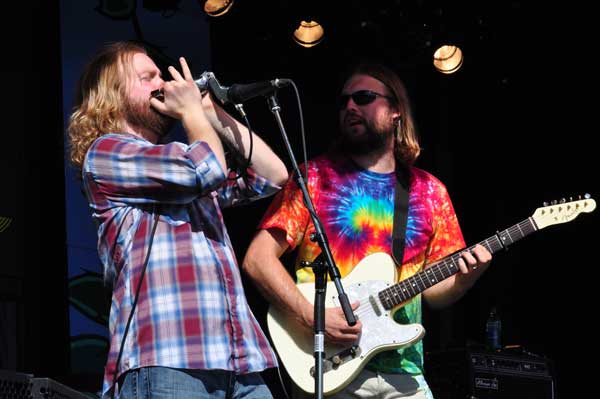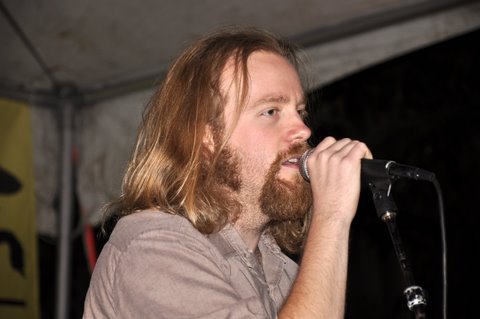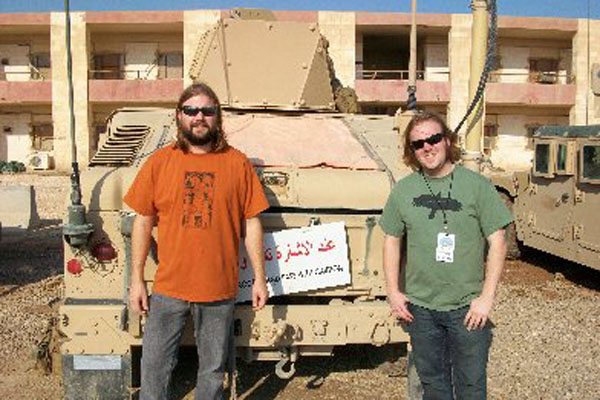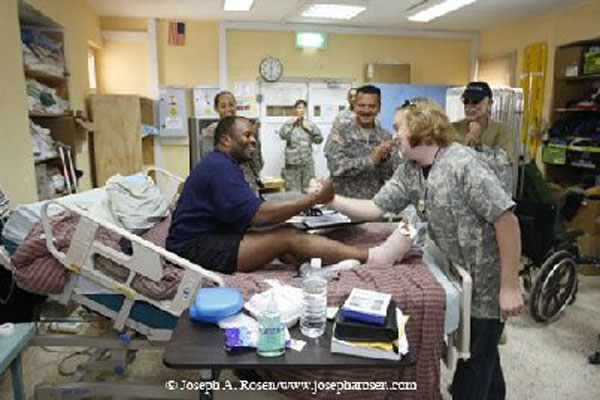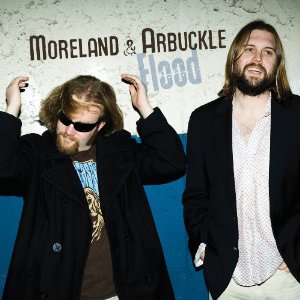'Flood' Warning
Corralling the fire and fury of Flood, Moreland & Arbuckle take their incendiary, blues-based message to the masses, proving en route that sometimes a cigar box is more than a cigar boxBy David McGee
Sigmund Freud famously observed that “sometimes a cigar is just a cigar”—an observation that gained fresh cultural currency during President Bill Clinton’s scandalous interlude with intern Monica Lewinsky—but the good doctor never encountered a cigar box guitar and the havoc it can wreak on the populace at large.
The cigar box guitar has been around since the turn of the 20th Century as a handmade alternative to pricey store-bought guitars beyond the financial reach of cigar box guitar practitioners, who were almost exclusively Delta blues musicians. In 2010 the cigar box guitar is alive and more than well: a Google search turned up more than 50 pages of entries on all manner of cigar box guitar literature, including these: from www.gamingblog.org, “Is a cigar box guitar better than Guitar Hero?”; a 1920s cigar box guitar made from an El Roi Tan cigar box for sale at VandM.com; a “Facts, Discussion Forum, Encyclopedia Article” site; a cigar box documentary, Songs Inside the Box; a Chicago Reader article asserting that “the cigar box guitar is undergoing a renaissance. In Chicago its most passionate proponent may be art teacher Diane Sutliff”; more YouTube videos than you want to know about; the site of Shane Speal, who heralds himself as “The King of the Cigar Box Guitar,” (http://www.shanespeal.com/fr_home.cfm), and is indeed doing wondrous musical things with the instrument in fashioning original music with cross-cultural leanings (his self-titled album, “recorded in the basement of Speal’s Shiloh home on a Zoom digital recorder he inherited from a deceased friend” and available at his website, includes a version of Jimi Hendrix’s “I Don’t Live Today” arranged for cigar box guitar and fife-and-drum band. Mr. Speal is not without a sense of humor, either. When a reporter asked him to explain the origins of his regency, he answered: “It’s a celebration of absurdity. Who would ever want to call himself the king of such a shitty instrument?”); a 1955 vintage cigar box guitar providing the howling soundtrack for a filmmaker’s wanderings through woods infested with the rotted out hulks of junk cars (http://en.kendincos.net/video-rpjvhpf-1955-cigar-box-guitar-dleta-blues-slide-guitar.html); guitars made from authentic Cuban cigar boxes (Daddy Mojo Cuban Cigar Box Guitars) available at Cigar Chief Authentic Cuban Cigars (“We charge only in Canadian dollars.” http://fujipub.com/cigarchief/Daddy%20Mojo%20Cigar%20Accessories.html); a clip of Shane Speal (whose face is not shown) playing a vintage 1953 model over footage from The Wild One in which a buxom young lass in a tight sweater coos to Marlon Brando’s biker rebel, “Talk to me, Johnny, sing me a song.” You get the idea. There is a Cigar Box Nation out there and it be hungry.
With all due and deserved respect to Mr. Speal, the artist most in the spotlight now with a cigar box guitar is the formidable Aaron “Chainsaw” Moreland, one-half of the hill country blues duo hailing from southeastern Kansas, Moreland & Arbuckle, the latter being principal lyricist/lead singer/harmonica virtuoso Dustin Arbuckle. (There is a third band member, too, in the indefatigable drummer Brad Horner, who now travels with the group full time. Moreland has also claimed in interviews—
http://randomville.com/wordpress/?p=847—that Horner, as a high school student, was the Kansas state champion for two years in the “Twister Challenge”—that’s Twister, the game, not an actual tornado, a common sight in the Sunflower State) A few years ago a friend of Moreland’s gifted him with a homemade cigar box guitar, and over the course of four albums Moreland has used it sparingly but to awesome effect. That is especially true of the instrument’s showcase moment on the group’s new album, Flood, when Moreland turns it loose on a version of “John Henry” that is unlike any other version of this venerable American standard that has been recorded by seemingly everyone, from Aaron Copland to Bill Monroe to Johnny Cash to the Supremes (their 1967 version being “Treat Me Nice, John Henry”) and on and on, across all genres. Typical of M&A, when they attack a cover song, they up the ante somewhere along the way. In this case, it’s by charging through the song with relentless, punishing fury and fierce urgency, as if the tale can’t be told too loud or too quickly in order to get its message across. Arbuckle’s searing vocal is given all the ballast it needs by Moreland’s rumbling, roaring, dive bombing assault via his cigar box guitar ahead of Arbuckle spitting out distorted, anguished harp retort to the guitar’s attack, while Horner keeps plowing ahead, bashing the cymbals to add a bit more atmospheric turmoil to the fevered goings-on.A review in last month’s issue referred to this moment as “the coming of age of Moreland’s cigar box guitar, which is, for the uninitiated, exactly what it sounds like: a guitar built from a cigar box, with hand-wound pickups and a single bass sting (running into a bass amp) and three guitar strings (running into a guitar amp) on a fretless neck. Its sound is dirty, malevolent, sonorous and erotically charged all at once—it doesn’t shake your nerves and rattle your brain; it hits you where you live. You wouldn’t blame Moreland for getting carried away with the orgasmic moan the instrument produces when he takes a descending or ascending run on its string, but being a man of discerning taste he is selective in his wooing, deploying its dark beauty at the most propitious moment in a song’s arc, and not a moment sooner…”
Moreland & Arbuckle, ‘John Henry,’ spring 2009, at The Diver, Wichita, KS“We definitely feel like we put our own spin on ‘John Henry,’” Dustin Arbuckle said by phone from Washington state, where the band was en route to a gig opening for Buddy Guy, which in and of itself is indicative of some major and encouraging changes in M&A’s fortunes since they were last featured on the cover of TheBluegrassSpecial.com in June 2008, upon the release of their powerhouse 1861 album. “’John Henry’ is the real featured piece for the cigar box guitar,” Arbuckle continues. “It’s featured on a couple of other songs, but on most of the record he’s playing regular six-string. ‘John Henry’ is a great showpiece song for it, which is why it’s the centerpiece of our set. Because Aaron can just destroy it on the box.”
In his laid-back Kansas drawl, Moreland admit, “Well, I do get going on it, fall into a groove,” when the conversation turns to “John Henry.” Of the cigar box, he adds: “I was real lucky; when I put that guitar in my hands I could play it. For some reason or another the way I play guitar lends itself well to that guitar. And I’m thankful for that because it’s unique.”
But there is more, much more, going on with Flood than the cigar box guitar’s shining moment, and more, much more, going on with Moreland & Arbuckle than merely having a new album out and a coast to coast tour in support of its release, which includes the duo’s first visit to New York City this month, in an opening slot for Jimmie Vaughan at B.B. King’s club on 42nd Street in Times Square, assuming no one rolls car bomb into place that night.
Since joining forces after meeting each other in 2002 at an open mic night in Wichita, KS, Moreland (now 35) and Arbuckle (now 28) have basically run the business side of their career themselves. That all changed two years ago, when, after playing a showcase the night after the Blues Music Awards in Clarksdale, MS, they met John Hahn, who was Shemekia Copeland’s manager, and along with Steve Simon was the moving force behind the Bluesapalooza tours that were taking blues musicians overseas to play for U.S. troops stationed in Iraq and Kuwait. M&A were invited on a Bluesapalooze tour, and when that draining but emotionally rewarding experience was done, Hahn was their manager. The timing was right, in that Hahn and the musicians alike were in holding patterns, looking for the right fit in their careers.
“John had never managed anyone else besides Shemekia, but he’d done a great job with her, and had been waiting a long time to pick up another artist, really wanting find the right person,” Arbuckle explains. “Of course we had really held off on getting a manager, because we had kind of done it ourselves for so long and wanted to feel like it was the right time before we started giving up some of that control. We wanted it to be someone we really felt could do some good things for us and someone we’d have a good working relationship with. Eventually we decided that John was that guy. He’s really facilitated a lot of great things happening for us.”
Moreland & Arbuckle, ‘Your Man Won’t Ever Know,’ an original song from the band’s new album, Flood. This performance was filmed at the Murdock Theatre, Wichita, KS, January 19, 2008Indeed. Hahn’s connections with the Telarc label (now part of the burgeoning Concord Music Group, which recently added Rounder Records to its roster of labels) and Monterey International Booking are paying off. Flood has distribution muscle like no other Moreland & Arbuckle album has ever known. As for bookings, a case in point is the circumstances of the interview for the 2008 cover story in this publication. At the time, your faithful friend and narrator connected with M&A via telephone, as they were driving a Ford Windstar Wagon from Kansas to Arizona, for a date at a bar. Check the intinerary on the M&A website now, and it shows bookings across the U.S and into Canada, opening for Vaughan, Robert Cray, Buddy Guy and Jonny Lang, among others, in venues such as the Silverton Casino in Las Vegas, House of Blues in Anaheim and Chicago, the Saskkatchewan Jazz Festival, the Winnipeg International Jazz Festival. Ths is a band on the upswing, riding the “big mo” with a superb new album and a dynamic live presentation to further win friends and influence people.
“This is allowing us to get out in front of a lot bigger audiences,” Arbuckle notes. “It’s especially great because the first time we go to a town, instead of playing in front of maybe 25 people at a bar, which obviously can be a lot of fun, it allows our introduction to a new city to be in front of more like a thousand people, and we can sell a ton of CDs and get a ton of names on our email list. And it virtually guarantees that the next time we go back to that city we know there’s going to be some people out to see us. That strategy has really helped us in building a new crowd.” (In fact, Arbuckle added that the band is selling so much merchandise at shows that it has had to hire someone to be a dedicated merch czar to travel with them and handle that business exclusively.)
Moreland strikes a more philosophical note in assessing the band’s turn in business fortunes, and a more personal one too. Eight years, or the better part of it, is a long time to be slogging it out on the road, and it was time to start feeling some traction being gained from all that work. John Hahn coming on board has made that happen. “I feel real fortunate,” Moreland says. “It’s not an easy business to be in some times, so I feel fortunate. Very happy to be able to making music for a living. It’s a wonderful thing to be able to do what you love. It’s tough being away from home, tough being on the road. There’s a real tough part of it. But playing music, it’s my passion.”
And that Windstar Wagon? “It died last November; it dropped its second transmission in about six months, and we partially destroyed it there by the side of the road in Minnesota, had it towed off to a salvage yard,” Arbuckle says.”Luckily that was at the end of our last real tour of the year, of 2009. Now we’re traveling in a Surburban. Little bit bigger, little more comfortable. But of course we’re bringing along an extra guy now, so it’s still pretty cramped.”
Dustin Arbuckle: ‘We’re at the point in our careers when every album should represent a major step forward, and Flood definitely does.”Still, this is all but prelude. Were the music lacking, this infrastructure would be no use. But Flood is hardly lacking. Moreland’s guitar work, apart from the cigar box sorties, is as striking as ever, whether he’s gone six-string electric, picking delicate, eerie lines on the parlor guitar on “Your Man Won’t Ever Know,” or adding frisky, colorful textures to his jubilant fingerpicked commentary on “Can’t Leave Well Enough Alone.”
But Moreland’s work leads to Arbuckle, and vice versa. In addition to asserting himself on this record as a witty, passionate, intelligent harmonica player well versed in all the appropriate fundamentals that have migrated from Mississippi to Chicago and back in days past, Arbuckle’s singing has never been more commanding. He sounds relaxed and locked in here to an even greater degree than he did on 1861; there’s freedom in his voice—in the release he anticipates with equal parts dread and ecstasy in “In the Morning I’ll Be Gone” (and in the steady, stout harmonica solo he adds to supplement his vocal); certainly in the chilling desperation he articulates with the slight tremble in his voice when he sings “rain keep fallin’/you watch the water rise/rain keep fallin’/you watch the water rise/you see it all/you see it all/you see it all/get swept away before your eyes/18 counties done got flooded out…” as the horrors inflicted by nature mount and consume “18 Counties” (a song, by the way, that’s preceded by an unsettling, even disorienting 1:17 bit of eerie, neo-psychedelic jamming meant to suggest looming disaster in “Before the Flood”). In the deep blues moan of a man who can’t exorcise the demons of a failed love in “Can’t Get Clear” or in his uncontrollable, murderous—and misplaced—rage in “Bound and Determined,” directed at a love he’s been told was unfaithful, until, too late, he finds out his source was lying. Amidst a furious blues-rock charge, Arbuckle spits out, “My body rots in prison but my soul will burn in hell,” as Moreland’s aggressive, aggrieved frailing serves as subtext to his partner’s blood-soaked soliloquy.
The title track reflects the personal nature Arbuckle’s writing has taken of late, most notably on 1861’s moving “The Legend,” based on his father’s wrenching experiences after returning from service in Vietnam. “18 Counties” was not only inspired by the horrific floods of 2007, when literally 18 counties in southeastern Kansas were declared Federal disaster areas, but was written even as the water was five feet high and rising. And Arbuckle Sr. figures into it ths one, too.
“It was back when we actually had some time during the middle part of the year,” Arbuckle relates of the song’s genesis. “At that time we were jamming during practice out on Aaron’s breezeway; it was raining outside when we wrote that song. It was during the time when all that stuff was happening and it was all very fresh in my mind. Again, another song that ended up being connected to my dad, because he lost his home in that flood. He lived down by Sedan, Kansas; I talk about Coffeyville, which is about another 30 or 40 miles southeast of Sedan and was probably hit the worst by it. I think there were something like two thousand people at the time of the flood who had to get out of their homes. The name of the song comes from the 18 counties in eastern and southeastern Kansas that were declared disaster areas. That was a very in-the-moment sort of song. It happened at the time. It became a staple of our set pretty quickly. It came together and got written within one rehearsal pretty much, and got thrown into the set pretty quick. We knew that song was a central tune on the record, too.”
‘Woke up this morning/dead rooster in my bed’: Moreland & Arbuckle perform Ryan Taylor’s ‘Pittsburgh In the Morning, Philadelphia at Night,’ at John Barleycorn’s, Wichita, KS, February 16, 2008. This song was included on M&A’s 2008 album, 1861; Taylor’s ‘Can’t Leave Well Enough Alone’ is featured on Flood.The music is remarkable, from the first opening blast of Little Walter’s “Hate to See You Go” to the closing, rustic (banjo and vocal only) reprise of “Can’t Leave Well Enough Alone,” a little country-flavored boogie with a soaring, singsong chorus, penned by one of the band’s favorite songwriters, Ryan Taylor, late of the Rounders, whose roaring “Pittsburgh In the Morning, Philadelphia at Night” was one of 1861’s highlights. Though carefully crafted, the album is the product of only two sessions in Wichita—one of which produced nothing of value in a day Moreland calls “the most unproductive ever in the studio,” followed the next day by sessions that yielded most of the finished versions of all 12 tunes on Flood. “Saturday was completely fruitless, a day of failed experiments, and Sunday we recorded at last 80 percent of the record,” Moreland says.
“We came in the next morning and the energy was just totally different,” Arbuckle adds about the second session. “We just started knocking stuff out, and it all came together really fast."
In the end, Arbuckle judges Flood “the best record we’ve ever made. I love the sounds we got. I feel like we’ve moved forward from a songwriting perspective. I feel like the vibe of the record is definitely earthier, more mature. I think we’re at the point in our careers when every album should represent a major step forward, and this definitely does.”
Postscript: The Power of Music
(Photo: Joseph A. Rosen, www.josepharosen.com)If Moreland and Arbuckle are feeling more hopeful about the future as result of their alliance with John Hahn, they can also thank their new manager for an opportunity to see up close and personal the power of music in people’s lives as they did on the Bluzapalooza tour of Iraq and Kuwait. It was a grind, Arbuckle says, marked by sunrise reveilles, strapping on body armor and helmets, flying in C-130s from one base to another, visiting injured soldiers in hospitals, playing for the troops in the evening, doing it again the next day.
“It was really grueling,” says Arbuckle. “It was a tough trip. We got a little taste of how they lived. A couple of days we went to hospitals at different bases, and met the soldiers there. Other days they’d take us around—one day we went to the Explosive Ordnance Disposal Unit at one base, and they took us out on the range and blew some stuff up for us, so that was fun (laughs). Just various things they had planned for us to do. Maybe you’d get a little bit of time to take a nap in the afternoon, but then it was time to go soundcheck and get ready for the gig. You’d play and have a good time, try and get to bed as quick as you could, then get up and do it all over again the next day. Stayed in the same kinds of living quarters and ate the same food.”
“A great experience, but very grueling,” Moreland concurs. “Two weeks of four hours’ sleep a day.”
While in Iraq with Bluzapalooze, Dustin Arbuckle visits an injured American soldier, whose spirits perked up after Arbuckle played him a bit of a gospel song on harmonica: ‘That’s when you really could see the value of the trip and see how you were doing something good for those people.’ (Photo: Joseph A. Rosen, www.josepharosen.com)One injured soldier in particular made a lasting impact on both musicians, one that has stayed with them and comes to mind every time they face an audience nowadays.
Arbuckle: “It was in the hospitals where you most felt the impact of what you were doing. The area we were in, things had really calmed down a lot. There wasn’t a lot of combat going on in the areas of Iraq near the bases we were going to, but guys still get injured out on missions. In one ward a guy had been there for several weeks with a foot injury. He was in the back of the room. You could just tell he was really bummed, really depressed. He didn’t want to talk to anybody, wasn’t happy to be there at all. We get back there and start talking to him, he didn’t seem to want to talk much. We told him we were there to do a blues show, and he kind of perked up, said he really liked blues, was bummed that he couldn’t go. I had a harmonica with me, so I said, ‘Let me blow you a tune, man.’ I played an old gospel tune for him and he just lit right up. Helped turn his day around. Actually, a guy who was an orderly on the ward came out to the show that night and made a huge deal out of how much it had done for the guy. He’d been in a real rough spot lately, been real depressed, and having that couple minutes had meant the world to him. That’s when you really could see the value of the trip and see how you were doing something good for those people.”
“It was a powerful set of emotions at work then,” Moreland adds. “It reaffirmed the power of music.”
Founder/Publisher/Editor: David McGee
Contributing Editors: Billy Altman, Laura Fissinger, Christopher Hill, Derk Richardson
Logo Design: John Mendelsohn (www.johnmendelsohn.com)
Website Design: Kieran McGee (www.kieranmcgee.com)
Staff Photographers: Audrey Harrod (Louisville, KY; www.flickr.com/audreyharrod), Alicia Zappier (New York)
E-mail: thebluegrassspecial@gmail.com
Mailing Address: David McGee, 201 W. 85 St.—5B, New York, NY 10024


